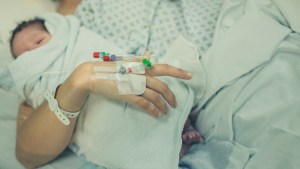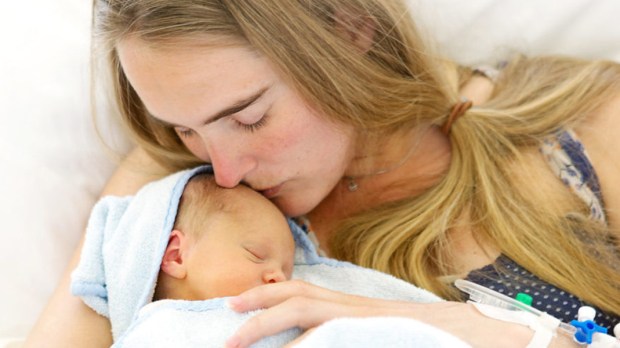After a roller coaster of a high-risk pregnancy, my youngest son was born six weeks prior to my due date. He weighed just over five pounds and could breathe unassisted, thank goodness. Grateful he was healthy, I kissed his pink cheeks and was wheeled off to recovery. My husband, thrilled over the birth of another boy, followed his new son to the special care nursery once I assured him I would be fine.
I remember the nurses hooking me up to monitors and checking my IV. I remember feeling both exhausted and overwhelmingly sleepy, and then I remember a nurse yelling for help. In my foggy state I looked toward the end of my bed and wondered why the nurses were moving red blankets from around my legs. The blankets were red — I was hemorrhaging profusely.
The rest of my side of the story gets fuzzy from here but I know my husband was rushed in. He remained at my head pleading with me to stay awake as the room filled with medical staff. I wasn’t conscious enough to be scared or to fully understand what was happening.
I’ve been told that I was wheeled back into the operating room, that my husband had to go back to the nursery with our son and wait to find out if I was going to be okay. While in the operating room, doctors confirmed that my uterus was hemorrhaging but could not find the site of the bleeding.
After I had lost nearly seven units of blood, my OB/GYN had to explain to my husband how dire the situation was. I was continuing to lose blood and their final option was a hysterectomy. They needed his immediate consent to perform the procedure but explained it was extremely risky because it would cause more blood loss and I had already lost so much.
While I was unconscious and intubated, my husband was brought to my side so he could see me before they began the procedure. He said he was hit with how ominous the situation was when he saw the faces of the medical team. He knew he was there to say what could be his final words to me and stood in the hallway as I was wheeled into an elevator with the team of physicians who would continue to try to save my life.
A short time later, the physician returned to my husband and told him their attempts were unsuccessful but there may be one other option to save my life. The obstetrician had recently been to a presentation by an experimental radiologist demonstrating a new device being used to find and stop internal bleeding. If the experimental radiologist was still in the hospital, they had one more option to keep me alive.
Luckily both the radiologist and the equipment had yet to leave for their next hospital and were paged to the operating room. My doctors performed the first uterine embolization in their hospital and it was a success.
I regained consciousness 14 hours after my son was born, as the intubation tube was being pulled from my throat. It felt like fire was rising through my body as I woke covered in tubes and wires. As my consciousness caught up with my understanding, I cried over the gravity of what had happened and the fact that I could only see my new baby in photographs. He ultimately experienced some breathing issues so needed to stay in intensive care. I was not doing so well myself so was also unable to leave intensive care.
In the days that followed, my condition improved enough for me to move to a recovery room in labor and delivery and finally see my son. As my husband turned from my hospital room to wheel me down the hall to meet my son for the second time a rumble of happiness filled the hallway. Some nurses clapped, doctors came up to pat my shoulder and shake my husband’s hand, hospital staff I had never met told me how happy they were to see me and their voices trailed off a bit. I knew what they meant; I knew if they had finished their sentences they would have said they were happy I was alive, that my son would have his mother because for a long, tense day, the labor and delivery staff braced themselves for the worst.
I am not one who enjoys being the center of attention. Knowing that my story was causing everyone to smile and clap and hug their families a little tighter made me uncomfortable, but it also made me grateful beyond explanation. When I finally gained the strength to walk again, I remember feeling the purpose of every step.
As moms we tend to belittle the importance of the job we do, but nearly losing my chance at mothering my children opened my eyes to just how important I am to the people around me. Yes, the dirtiest, least sought-after, most demanding jobs are often left for us, but we are fiercely needed by the people we’ve brought into this world. The moment our children are placed in our arms, whether after birth or adoption or an unexpected stay in the ICU, our role in life becomes infinitely more important. Not because we’ve lost ourselves to a new role — but because we’ve gained the opportunity to continue living with the most precious of gifts.
A year after my son’s birth, we visited the doctors and nurses who saved my life. They recounted more stories I don’t remember about that day, and we hugged as they said how good it was to see us again. I left the hospital for the second time, grateful for the miracle of medicine and the promise of a lifetime of birthdays with my little boy.

Read more:
The day I almost died in childbirth

